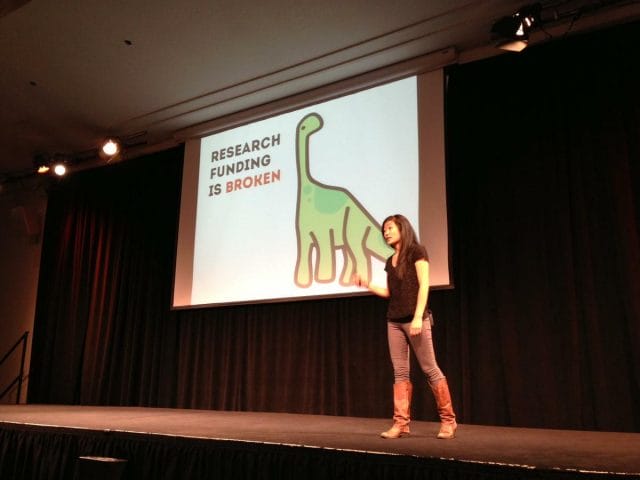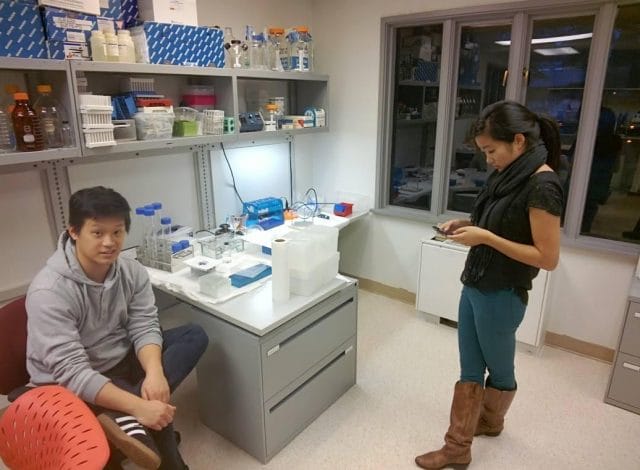Cindy Wu was at a party explaining what she does for a living. As Cindy, the CEO of a startup called Microryza, explained that her company was a website for crowdfunding scientific research, she was excited to learn that her fellow party-goer had heard of the company. Cindy’s excitement deflated, however, when the person exclaimed, “‘Micro-Zynga, I love you guys!” That’s when Cindy knew they really, really had to change the name of the site.
Over the past year, everyone had mispronounced or misspelled the name Microryza (pronounced “micro-rise-ah”). This was a problem, especially since the primary way the site spread was by scientists sharing that they were trying to fund a project on the site. “Word of mouth” marketing would be significantly diminished if no one could pronounce the name. Accidentally being called “Micro-Zynga” was the last straw. The team decided to change the name.
It was a daunting task. Choosing a fitting name for a company is difficult. Getting that domain name is even harder. Easy to spell domains that are “real words” are hard to come by and extremely expensive. For example, Candy.com sold for $3MM, Toys.com sold for $5.1MM, and GiftCard.com sold for $4MM. Not only are good domain names expensive, but there is a whole industry of speculators who buy up available names in bulk with the hopes of selling them later at a premium.
With this backdrop, it’s remarkable that the founders of Microryza acquired the domain name Experiment.com and rebranded the company as “Experiment.” The team at Experiment / Microryza was gracious enough to share their story with us so that others could learn from their experience. This is the story of how they bought the domain name Experiment.com.
What’s in a name?
The name “Microryza” was a play on the word “Mycorrhiza,” a fungus that helps other bacteria grow. The founders of the company, biologists from the University of Washington, thought of the company playing a similar role to the fungus; their crowdfunding site would help other science experiments grow. The founders loved the name’s quirkiness and how it captured the spirit of the company. Before they even built a prototype of the site, they had settled on the name because it so perfectly captured their mission.
Microryza went through the Y Combinator (YC) startup program in Winter 2013. During that time, YC founder Paul Graham asked how committed they were to the name Microryza. The founders responded that they were dead set on it.

Cindy Wu presenting to investors at Y Combinator demo day.
As the company went through Y Combinator, the name started wearing at them. Spelling and pronunciation issues kept coming up. After explaining the name to investor after investor, and spelling it out for journalists, the team was ready for a name that made intuitive sense. Or at least one that spellcheck recognized. By the time they graduated from YC, the team was mentally done with the name Microryza.
Still, the founders put off rebranding the company for another six months. They needed to work on the product, recruit, and grow the company. Changing the company name seemed too cosmetic a change compared to all the other work to be done.
The “Micro-Zynga” incident alluded to above finally pushed the team over the edge. They had to change the name! While the founders loved the biology reference, at best 1 out of 100 people got it. It was time to move on.
Co-founder Denny Luan was in charge of the effort to find a new name. He set a Thanksgiving deadline, which gave them about three months to rebrand the company.
Denny started by pouring through a dictionary and creating a list of 500 potential words. They wanted a name that was both descriptive of their mission and quirky. That meant a name like “science-funder” was out because it was too literal and boring.
One of the 500 names that the team liked was “cofactor.” A cofactor is a chemical that binds to proteins and can trigger reactions. Denny thought the name was pretty good. They thought of their platform similarly as a catalyst, and the domain name looked to be available since it was just “parked” (a landing page with ads on it).

Denny couldn’t get hold of the owner of the domain, so one of their investors introduced them to a domain broker he had previously used to acquire a 4-letter domain name. The broker would help them find the owners of domain names, negotiate the price, and handle the transaction in exchange for a 10-15% commission of the price of the domain.
The broker was able to get in contact with the owner of Cofactor.com. The owner wanted $25K for the domain. The Microryza team liked the domain, but their budget was $12-15K for that domain. The team was conflicted. Should they increase the offer? When Denny looks back at it, he is fairly confident that the owner would have accepted if they had raised their bid to $20K. The Microryza team nearly raised their offer, but decided to walk away. It just didn’t feel right.
After nearly acquiring a new domain name, but not succeeding, the initiative to rebrand the company stalled. For the next couple of months, the team went back to working on the product, building new features, and figuring out how to grow.
With the Thanksgiving deadline looming, Denny was still responsible for finding a new domain name. A couple of months before the deadline, Denny re-engaged with their domain broker.
This time, Denny wanted to explore dropping the “Micro” from their name to rebrand as “Ryza” or “Risa.” Denny didn’t love this option, but he felt that having a good option like this would let him more clearly evaluate other alternatives. As it currently stood, everything sounded better than “Microryza.”
An advantage of working with a broker is that a good one can “ballpark estimate” the price of a domain based on past experience. For a domain like Ryza — four letters but not a real word — the broker estimated it would cost around $5K.
The broker easily made contact with the owner of the domain, a professional domain speculation network, through a mutual contact in the industry. The domain was available and the price was around what the broker predicted.
Denny and Microryza decided to pull the trigger on the domain Ryza.com for $7.5K. The broker handled the entire transaction using an escrow service to make sure the respective parties transferred the cash and domain into the account before either was released.
Rebranding the Company
The new domain was acquired! Microryza was set to drop the “micro” from their name and become Ryza. Denny just needed to implement the new name on the front end of the site. But with two days left before the Thanksgiving deadline, Denny still had not started the rebranding implementation. The name didn’t thrill him, so he kept putting off the task. Denny recalls:
It was just settling for a domain choice. In 40 years, when I told my grandkids what I did, I shuddered at the idea of telling them I worked at a company called ‘Ryza’.
Instead of working on the rebranding, Denny surfed the web, wistfully looking at domains that would not be theirs. On a whim, he typed in Experiment.com. He found that the name was not being used for anything, so he fired off an email to the owner of the site (the owner’s email address was listed in the domain’s public registration info). Denny explained in the email that Microyza helped crowdfund scientific experiments and enquired whether the domain was for sale.
The owner of Experiment.com wrote Denny back within 30 minutes. A few minutes later, they were on a Skype video call, even though it was around midnight. The owner of the domain loved the team’s mission. He had a masters in physics and had bought the domain in 1996 hoping that one day it would be used for some noble purpose. At the end of the call, the owner of the domain told Denny that he would consider selling Experiment.com to them because he liked their work.
The founders conferred. They were prepared to settle for Ryza.com, but suddenly Experiment.com was available. That’s like being engaged to a high school boyfriend only to learn that Brad Pitt is interested in dating you. Never in their wildest dreams did they consider that they could get a domain like that. What to do?
Upgrading domains would be costly. The owner of the domain didn’t mention any particular price, but he did mention that people had offered six figure sums for the domain. He never entertained them, though, because the offers were from domain speculators looking to “flip” the property.
This time, Denny and the owner of the domain negotiated directly instead of using a domain broker. According to Denny, the owner of the domain wasn’t trying to get the highest possible price. The owner knew his domain had value and wanted a fair price, but he genuinely wanted to see the domain put to good use.
After weeks of gentle negotiating, they came to an agreement: $54K in cash for the domain. It was a lot of money for the startup, but the domain name was a valuable asset and a brand the team could rally around.
So Microryza rebranded as Experiment. Unlike when they almost became Ryza, Denny was thrilled to implement the new brand of Experiment on the site. Two weeks ago, the new name went live and the company announced their rebranding to the world. The team positioned the change as the company growing up. It now had a serious name to match its maturity as a funding platform for research.
According to the founders, the response so far to the new name has been fantastic. They have no buyer’s remorse. Scientists emailed them to congratulate them on the rebrand and confess that they felt better about the company with the easier to pronounce name. The founders discovered that journalists appear to take them more seriously as well.
Conclusion

Denny and Cindy
The rebranding to Experiment from Microryza was a long road. The team tried using a broker and found that to work well for efficiently acquiring a name. But they ultimately got an amazing name when they handled the process on their own. Sure, they got a little lucky because they connected with a domain owner that shared their vision for science. But if they had just “gone by the book” and used a broker, they never would have gotten Experiment.com.
The history of startups is filled with little stories like this one, where the founders made their own luck. In this case, the founders finally found a name that matches their aspiration to revolutionize how science is funded.
This post was written by Rohin Dhar. Follow him on Twitter or Google Plus. To get occasional notifications when we write blog posts, sign up for our email list.




